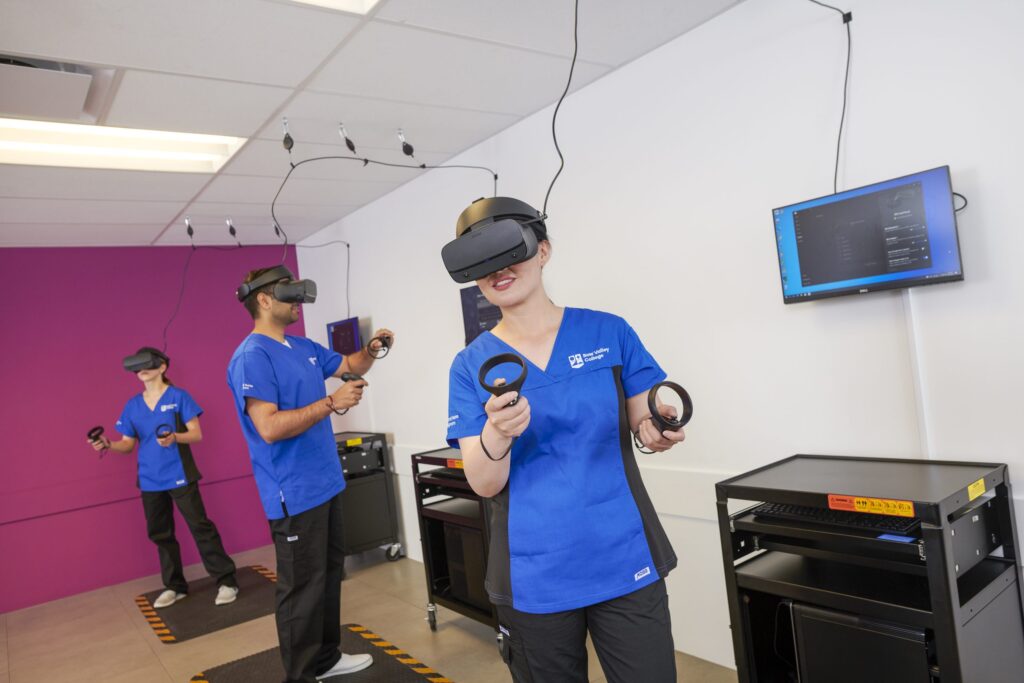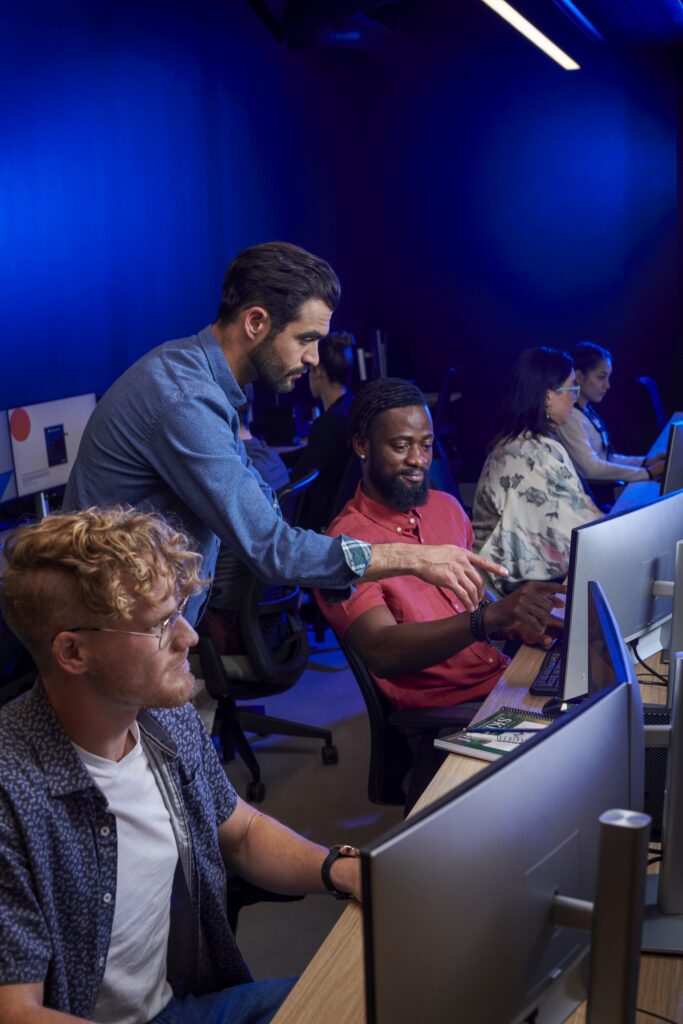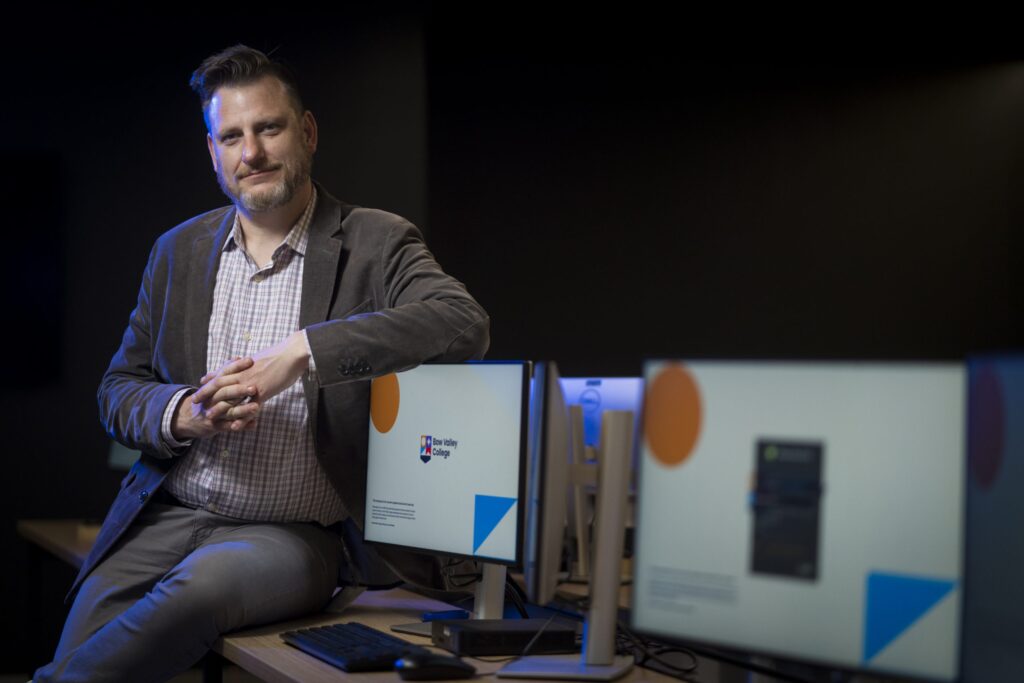Bow Valley College has been an access college since 1965, earning a reputation for fast-paced programs that quickly respond to the practical needs of adult students and our economy. On May 16, 2023, the College launched a new Digital Strategy, which outlines how technology will enhance the student experience, improve administrative efficiency, and drive innovation. The College’s guiding principle for the Digital Strategy reflects its roots: Bow Valley College strives to become one of Canada’s leading access colleges in technology innovations for teaching, learning, and student supports.
The College has identified five categories of initiatives as crucial to the success of the Digital Strategy: enhancing the student experience, enhancing the applicant experience, academic innovation, enabling employee success, and supporting strategic success. The goals of digital inclusivity and universal access underpin all aspects of the Digital Strategy: a “digital-first” strategy can only succeed when the College can ensure equitable access to technology and connectivity.
“The way we learn and work has changed and continues to change at a rapid pace. Partnering with technology companies to build an ecosystem that properly supports this transformation is therefore a crucial step in the process,” says Dr. Misheck Mwaba, president and CEO of Bow Valley College.
The new Digital Strategy is made possible thanks to the support of collaborators including Microsoft, Dell, VMWare, Nvidia, and D2L.
Just a Quick Note:
InnovationsOfTheWorld.com has partnered with Trade License Zone (TLZ) to support global innovators looking to expand internationally. Take advantage of the UAE’s Free Zones—enjoy streamlined setup, low corporate taxes, and a strategic gateway to the Middle East and beyond.
Get Your UAE Free Zone License Fast & Easy!The following are examples of Bow Valley College’s academic innovation initiatives.

VIRTUAL REALITY
Imagine a nursing student assessing a patient’s pneumonia symptoms without ever leaving a lab.
It’s possible at Bow Valley College. With its proprietary virtual reality platform, students in the Practical Nurse Diploma can perform assessments on diverse virtual patients, who can demonstrate a range of symptoms for respiratory conditions, including pneumonia, asthma, or anaphylaxis. Students can also practice cardiovascular and eye, ear, nose, and throat assessments. VR simulations have transformed the way students learn from and engage in patient scenarios. When the College introduced the VR platform after winning a research grant with ICOM Productions, students went from assessing healthy classmates and waiting for patients with conditions in clinical placements to immersive learning in the simulation environment. This ensures students can practice skills and gain valuable clinical experience assessing a wide range of symptoms, without the need for an actual patient with an illness.
“The VR focused assessment (VRFA), which is formally embedded in the nursing curriculum, is the first of its kind in Alberta. VRFA has multiple modes (equipment tutorial, course tutorial, assessment mode), multiple stations to allow all our students to experience it, and multicultural standardized virtual patients,” says Maria Manese, program chair, nursing, at Bow Valley College.
The VR platform is funded in part by Alberta Innovates, the Ministry of Economic Development, Trade and Tourism, and the Government of Alberta.


VIRTUAL DESKTOP
When Bow Valley College Centre for Entertainment Arts student Jordi Venegas was visiting his family in Ecuador over the holidays, he was able to access a College-supplied “virtual desktop” configured with more than $6,000 worth of hardware, software, and licenses using his seven-year-old Linux laptop and an internet connection, at no cost to him.
The Bow Valley College virtual desktop solution provides students and employees with access to very high-end computing that can ably handle high performance software used in Bow Valley College’s Centre for Entertainment Arts programs, such as Unity, Unreal, Maya, and ZBrush, from anywhere in the world, and on any device, such as a tablet, a smartphone — even an old laptop. All they need is an internet connection.
“I have the advantage of having a super high-powered computer in the palm of my hand,” says Venegas. He adds that in Ecuador, he was able to run resource-intensive animation simulations and rendering, all from that old computer.

“Bow Valley College’s ability to provide high-performance GPU-based virtual computing power to students, regardless of their location, is a key differentiator in the value our institution can provide,” says Jason Mansell, director, information technology services at Bow Valley College. “The virtual desktop levels the playing field between students who have access to extremely high-performance technology at home and those who don’t who would traditionally need to be on campus to have access to that kind of computing power.” He also notes that this modern technology approach also reduces maintenance efforts, is very secure from cyberthreats, and allows the College to meet the needs of changing programs much faster.
The Bow Valley College virtual desktop was made possible thanks to products and support provided by Dell Canada, VMWare, Nvidia, and Pure Storage.


PIVOT-ED
Andrea Pinsent has been working in human resources and labour relations for 17-years and needed to upskill in workforce planning as it had become a priority focus area in her work. When she received an email from CPHR Alberta about Bow Valley College’s new micro credentials in people strategy, it immediately caught her attention. “I appreciated that the micro-credential considered my current education and professional expertise,” she says.
With the rapidly changing economy, there is a need to upskill and reskill to meet the evolving needs of the workforce’s demands. Pivot-Ed micro-credentials are cost-effective, competency-based certifications obtained by demonstrating the skills required by a particular industry. Pivot-Ed micro credentials are assessment-first, which means they measure existing strengths and give students recognition for that competency. Then, the program determines what students still need to demonstrate to earn the micro-credential. Pivot-Ed micro-credentials also target individual needs and allow individuals to continue their professional growth and stay relevant in an ever-changing landscape. “The HR profession is always shifting, so having Bow Valley College offer these micro-credentials to our members allows them to be educated with the most up-to-date HR trends and provides agility to respond to the ever-changing workforce,” says Tracey Stahn, manager, member engagement at CPHR Alberta, who partnered with the College to promote the micro-credentials to their HR professional network.
Pinsent has finished the Strategic Workforce Planning Pivot-Ed micro-credential and is about to start Talent Acquisition. “It met my needs, but it also met my budget, and the location, I really liked that it was virtual,” she says, having considered options that were much more expensive and involved travel. She also liked that she could put the certifications on her résumé, LinkedIn profile, and performance evaluation, as opposed to just a three-hour webinar. “It has more weight to it,” she says.


BOW VALLEY COLLEGE CENTRE FOR ENTERTAINMENT ARTS
Picture Pedro Pascal and Bella Ramsey walking on a gloomy day with half-destroyed office buildings and collapsing condo towers in the background.
It’s the Calgary skyline, as portrayed in the post-apocalyptic drama The Last of Us. The hit HBO series is just one of the many productions the city and its surrounding areas have played host to over the past several years. According to Calgary Economic Development, the city is home to more than 6,700 people who work in the creative industries of game development, film, and television. In 2023, three local standing sets received the Location of the Year award at the Global Production Awards in Cannes, France.
There has been so much activity that, to meet demand, in January 2021, Bow Valley College teamed up with the Centre for Entertainment Arts to launch a training ground for students interested in careers in film, TV, animation, and gaming.


The Bow Valley College Centre for Entertainment Arts contributes to diversifying our economy and creates jobs in a growing sector. “Bow Valley College Centre for Entertainment Arts will train the next generation of talent to support the growth of Calgary’s creative industries,” says Alison Anderson, dean, business, technology, and Centre for Entertainment Arts. “The Centre will help make Calgary’s creative economy a global leader and contribute to the city and province’s prosperity.”
Bow Valley College Centre for Entertainment Arts offers programs in advanced film production, foundation in entertainment arts, advanced 3D animation and 3D modelling, advanced visual effects (virtual production), and advanced game development.















